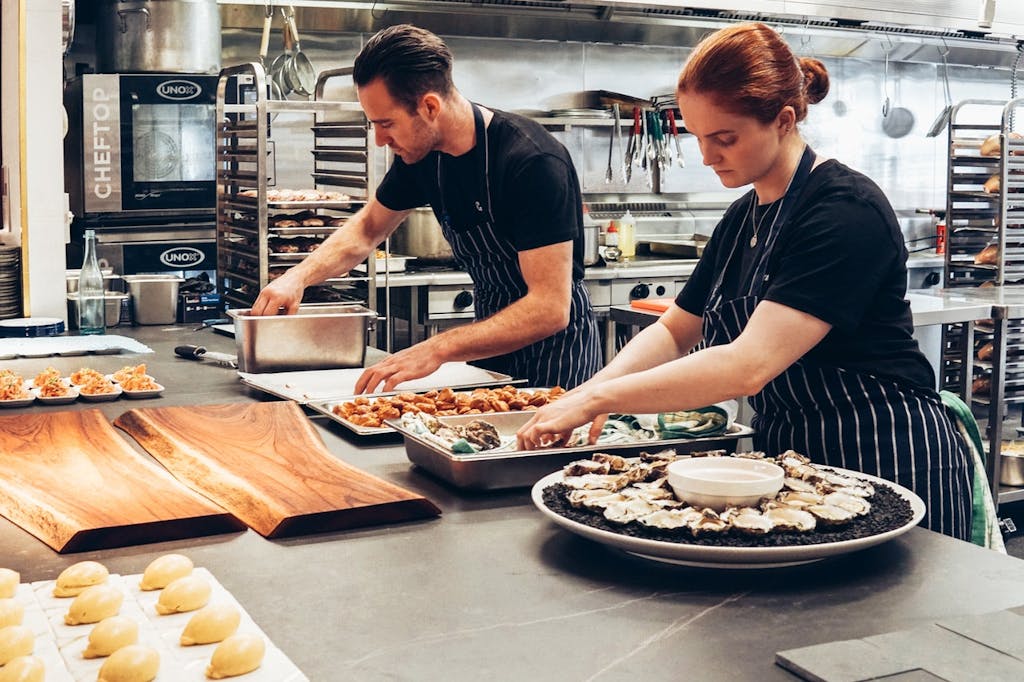Online or in person, learning about wine has never been more accessible
Sommeliers in action, England, Ca. 1870. (Photo by adoc-photos/Corbis via Getty Images)
Corbis via Getty Images
Back to school might seem like a long way off, especially if you’re gearing up for school’s out, but if wine studies are in your future, it’s never too early to plan.
Why study wine? Sure, it will help you out when looking at a wine list or a retail shelf, and knowing a bit lessens your chances of buying a disappointing bottle. But it also enhances your enjoyment of what’s in the glass if you learn about food pairings at the same time. When you hone a skill for matching flavors, acid, tannins and textures, your meal plans will be elevated—even on a Tuesday night (speaking of which, on this Tuesday night I’m having a Gewurztraminer from Alsace with my spiced chickpea, coconut and turmeric stew).
A third reason: if you like to travel, a wine education will deepen your journey. You’ll eschew the ho-hum tourist spots to go to the Italian Dolomites or the South American Andes, Hungary’s Tokaj region or the Ribeira Sacra in Spain. And everywhere you go, you’ll have the unique experience of food and wine in their cultural and historical context.
Here are a few of the easily available options for your vinous pursuits. Some lead to a certification, some entitle you to add fancy letters after your name, but all of them offers solid know-how for however you want to enjoy the wine life. In addition to tuition and exam fees, expect to purchase supplementary textbooks for in-depth programs, wine for tasting practice, and even invest in travel to wine regions for the ultimate in hands-on education.
CMS
CMS
Court of Master Sommeliers (CMS). The American chapter of CMS was made famous by the “SOMM” movie and its sequels but was also beleaguered by an exam-cheating scandal in 2018, and, two years later, by a sexual-misconduct scandal involving a group of male members. The court has been since undergone the equivalent of the Alcoholics Anonymous “Step 4” (“a searching and fearless moral inventory”). Organized into four levels, each building upon the previous in knowledge, rigor and price, CMS leads to the Master Sommelier certification, one of the most prestigious in the industry. Graduates typically work in hospitality/fine beverage service, education or in import/distribution. Offered in-person and online. $699 for the intro course and exam; $1,798 for the advanced course and exam; and $2,790 for the three-part Master exam.
SWE
SWE
Society of Wine Educators (SWE). Offers professional credentials in the specialist of wine certification and the certified wine educator tracks. The self-study program offers study aids online such as workbooks, flashcards, maps and prep classes. Exams are administered online or in person at designated test centers. The pricing schedule reflects costs for exams and materials, with discounts offered to SWE members who are entitled to view specialist sessions on regions, viticulture and other topics. The general public can view 90-minute webinars on what to expect from an exam or course of study. This generalist program attracts a wide range of wine lovers, from enthusiasts to sommeliers, consultants and those in communications. $135 membership fee.
The French Scholar pin
WSG
Wine Scholar Guild (WMG). Offered in person in select cities and on-demand/online everywhere, this specialist program delves deeply into studies of French, Italian and Spanish wines. WSG is a popular add-on for students who already have a generalist credential and want to specialize and takes it a step further with master-level programs in regional topics such as Bordeaux, Burgundy, Champagne and Loire, and a Sherry specialist program. Students may supplement their studies with educational wine tours (currently sold out for 2022). Last year, WSG launched “The Science of Wine Tasting,” a series exploring wine from more intuitive sensory descriptors beyond the traditional flavor grids administered by CMS and WSET. Pricing for the signature programs is $595 for independent study and $790 for a 10-week instructor guided format. The Italian program is delivered in two segments, each costing $695. Master levels are $495 and include study manuals online study program and exam.
WSET
WSET
Wine & Spirits Education Trust (WSET). WSET offers four levels of wine education, a trajectory that prepares people for the Master of Wine credential administered by the Institute of Masters of Wine. While the first three levels are accomplished in weeks (Level 3, for example, is 30 hours of classroom time), Level 4’s Diploma track suggests a minimum of 500 hours of study time (five months of in-person classes) and takes between 18 months and three years to complete. The first three levels satisfy the interests of wine enthusiasts; the Diploma kicks it up to expert level and can position a graduate for a substantive job in wine education, communications, import/export/distribution business. Classes are offered both online and in person—the larger programs in the U.S. are in California and New York. Check with local providers on pricing.
Others to consider:
Sommelier Society of America. Founded in 1954, this is the oldest professional wine organization in the U.S. Courses are offered twice yearly in fall and spring and include weekly lecture/theory classes, tastings and blind-tasting training, textbooks/materials and the final exam. Remote and in-person options, but the exam must be in person. $2,595.
GuildSomm is an online resource for those in the industry or students in any of the specialist programs, but anyone can join upon paying the modest membership fee ($100/$150). The site consists of articles written by subject experts, comprehensive study guides by region and access to e-learning courses, webinars and podcasts. Members can also take advantage of featured discounts on books, glassware and accessories.

:max_bytes(150000):strip_icc()/types-of-engagement-ring-settings-guide-2000-86f5b8f74d55494fa0eb043dee0de96e.jpg)

More Stories
Cinnamon Roll French Toast Casserole
Peanut Butter Kiss Cookies – Fit Foodie Finds
Crisp Apple Salad – A Couple Cooks